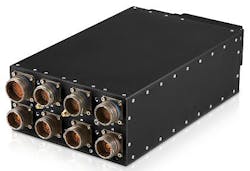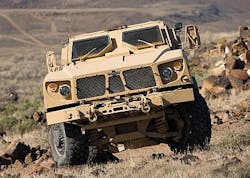GMS designers say they have found a way to deploy high-end computer servers in a mobile vetronics architecture
RANCHO CUCAMONGA, Calif., 15 April 2012.Embedded computing experts at General Micro Systems (GMS) Inc. in Rancho Cucamonga, Calif., say they have developed vetronics computing technology for military combat vehicles and similar military embedded systems that has true high-capacity server performance in a rugged, conduction-cooled package for mobile electronic warfare, signals intelligence, communications intelligence, and other demanding vetronics applications.
This rugged mobile server technology comes with the introduction of the GMS SCZ91X Zeus super-server, which GMS experts say offers systems designers an eight-fold performance improvement over any other existing vetronics embedded computing, as well as security of data and operations through a trusted computing platform.
"We took high-performance server chips from Intel and put them in a rugged environment with server-class memory," says Ben Sharfi, president and chief executive officer of General Micro Systems in an interview with Military & Aerospace Electronics.
"We took a 120-Watt computing engine and our patent-pending cooling, and gave it 96 gigabytes of RAM -- with plans to expand memory to twice that," Sharfi told Military & Aerospace Electronics. "The processor has six virtual cores with hyperthreading, plus six completely isolated share-nothing architecture I/O subsystems -- one for each subsystem and one for each core. Each I/O is independent of the other virtual machines."
Sharfi explains that his engineers at GMS designed the Zeus super server for vetronics applications in response to military and industry needs for a server that can run several different applications on different operating systems simultaneously without interrupting the main processor or operating system.
At the heart of the GMS Zeus mobile vetronics server is the Westmere-EP processor -- the most powerful Xeon 5600 processor from Intel, Sharfi explains. the Zeus is based on six physical CPU cores with hyperthreading for a total of 12 cores. Each core operates at speeds as fast as 2.4 GHz, with the ability to run in TurboBoost mode at speeds as fast as 2.67 GHz.
Each guest and core runs in uninterrupted operation with the Westmere-EP's integrated memory controller and high-speed memory, Sharfi says.
The Zeus vetronics embedded computer, Sharfi says, replaces dedicated processing systems or single-level servers, and can run several independent guest operating systems concurrently through a hypervisor or virtual machine manager.
"Everybody's system in the rugged market today is, at best, Intel Core i7 based, and at best will have 16 gigabytes of RAM," Sharfi says. "this is an industry-first true server, not a workstation, that truly replaces six independent pieces of hardware."
The Zeus vetronics server architecture should be of particular interest to vetronics designers who are trying to stuff all manner of computing equipment and sensors in the back of a Humvee or similar small or medium-sized vehicle.
"All that big box that used to be mounted in the back of the Humvee, right behind the guy's neck blowing heat, now that's mounted under the vehicle frame under the seat," Sharfi says. "This will shrink vetronics by 800 to 1,000 pounds, and all the heat is under the seat and conducting to the frame, and away from the crew."
Zeus also conforms to Trusted Platform Module (TPM) guidelines, which describe a hardware-based system that can encrypt or scramble data to seal applications and the operating system from malware, hackers, or inadvertent corruption. The system also can block the computer from starting detected unsecured devices. "It is absolutely critical that each and every time a system is turned on that nothing has changed since its last use," Sharfi explains.
The Zeus supports the most common Hypervisors by VMware, Wind River, and Microsoft, and can be shipped with operating systems such as Windows 7, Linux, and VXWorks already installed.
For more information on the Zeus vetronics server architecture contact General Micro Systems online at www.gms4sbc.com.
Follow Military & Aerospace Electronics and Avionics Intelligence news updates on Twitter

